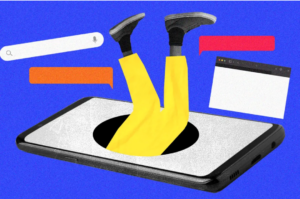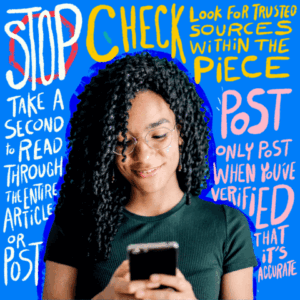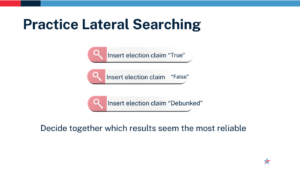Hướng dẫn
Tài nguyên đào tạo trò chuyện với bạn bè và gia đình
Truy cập và tải xuống tài liệu đào tạo của chúng tôi để có cuộc trò chuyện hiệu quả và có tác động về kiến thức thông tin.
Hướng dẫn
Let’s face it, it’s not easy separating fact from fiction on the internet no matter how intelligent we may be. So, what can we do to discern the credibility of what we’re reading? One fact checker strategy is called lateral searching.

Lateral searching simply means looking at sources of information side by side or, rather, tab by tab. Instead of going deep down the rabbit hole that algorithms so easily lead us, we do a broad search.
“Lateral reading helps you determine an author’s credibility, intent and biases by searching for articles on the same topic by other writers (to see how they are covering it) and for other articles by the author you’re checking on. That’s what professional fact-checkers do.” From the News Literacy Project, Expand your view with lateral reading.
Important Questions to ask while determining whether to trust a source of information.
The most important question you can ask is, “Who is behind this information?” And then search on the person or more likely, group, who wrote it on Wikipedia. A website may have an “About Us” section that tells you who wrote it or look for the author’s byline.
Another useful site is Media Bias/Fact Check. They rate bias and factual or not so factual reporting. Also, if a group or person is notorious for false and misleading claims, a simple google search will pull up all sorts of articles with examples that can give you more than enough information to know they can’t be trusted.
If you are trying to share verified information with a loved one and they do not trust your source of information, that is OK! The reality is that Bad Actors have done a good job turning Americans away from verified information and towards trusting lies and propaganda. We can overcome this fact by supporting your loved one while they try lateral searching.

Hướng dẫn
Thư
Hướng dẫn
Báo cáo
Common Cause has spent 2025 proving that special interests are no match for our people-powered movement that began over 50 years ago.
From the halls of Congress to local election offices, we’ve built a movement that stands up to corruption, strengthens accountability, and protects the power of the people. And with your help, we can go even further.
Make your Year End gift to defend YOUR rights →

